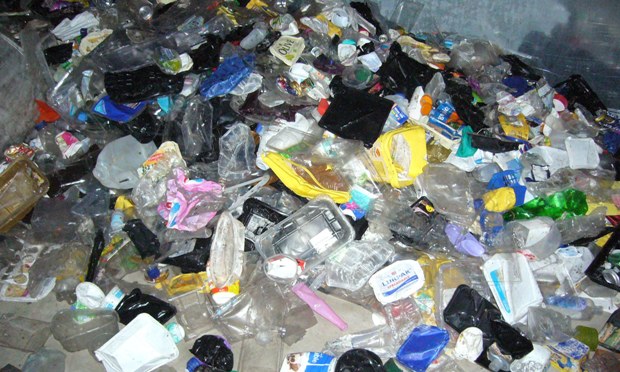Romans can take tangible action toward industrial expansion in the community simply by recycling their 2-liter or 20-ounce plastic bottles.

Marglen Industries President and CEO John Burnes said that if there were more bottles available, Marglen could have expanded once, maybe twice in recent years.
“There is a definite need for the material that we can manufacture, but the supply of bottles is a great concern,” Burnes said. “When you start pulling out for a capital expenditure and you’re really not sure of the supply of bottles, it makes it tough.”
Marglen was founded in 1972 at 1748 Ward Mountain Road in the Model community. Since then, the company has expanded 13 times, adding plants in Boaz, Ala., Royston, Calhoun and White.
The company was sold in 1998 and, four years later, spun off all of its carpet assets to Beaulieu. Carl and Mieke Bouckaert used Marglen as an anchor for a new holding company outside of Beaulieu. Marglen, along with several other properties and a mill in Canada, became part of C and M Holdings.
A couple of years later, the Bouckaerts went through a divorce, and Marglen became a part of Mieke DeClerc Hanssens’ property, along with the Kingston Downs property where the Atlanta Steeplechase takes place each spring.
“She’s a real nice lady and has been very good to us. She’s got a real good environmental conscience,” Burnes said. “Recycling is very important to her.”
In 2008, Burnes and Marglen made a strategic decision to take advantage of the company’s expertise in recycling.
“We knew how to take garbage and sort out plastics and clean it and make something out of it,” Burnes said.
About that same time, big brand companies — Coke, Pepsi, Nestle and others — began to express serious interest in reusing some of the plastic in their older generation bottles for their new product lines. Marglen went to Europe and acquired equipment that facilitated the recycling.
“It’s a machine that can take the bottle flake, which is a ground up washed portion of bottle, disinfect it and melt it into a pellet,” Burnes said.
Some customers use the pellets as a 100-percent component or use it as a blend.
In the last couple of years, the carpet industry has really taken a hit, forcing Marglen to aggressively seek new markets for its recycled plastics.
“Fiberfill, stuffing, furniture filling, some automotive applications like trunk liners, some door panels in cars and other geotextile uses,” Burnes said.
In the last six months, because of the world cotton market, Marglen’s business has really picked up. The fiber-like end product, which resembles a bale of cotton, is being blended in manufacturing processes from China and India to Kuwait, Mexico and Europe.
The Marglen plant runs 24 hours a day, seven days a week with close to 200 employees.
“We use about 2.7 billion bottles a year, PET bottles that are recycled,” Burnes said. “We buy those throughout the U.S., some in Mexico, some in South America, some in Canada.”
Marglen probably gets nine out of 10 loads created by the Rome-Floyd Recycling Center.
“Baled bottle pricing is very volatile, but typically it’s a pretty low-priced raw material, so freight is a huge factor as a percentage of end product, so we try to get it as close to Rome as we can.”
Mark Skeggs, director of the Rome-Floyd Recycling Center, said the Mohawk mill in Chattooga County is basically the only other bid-
der for its plastics. The Rome center turns out about nine loads of 27,000 pounds of plastics a year.
“The price for plastic is way up,” Skeggs said, adding that the last load sold was $686 per ton.
“We really value Marglen, and I love the idea that we’re selling mill direct and in Floyd County,” Skeggs said. “You know I’m happy that it creates jobs in Floyd County.”
Burnes said the competition for raw material is fierce because of the tremendous shortage in the U.S. of recycled bottles.
“For every bottle that is sold on the store shelf in Georgia, Tennessee, Alabama, Mississippi and South Carolina, only 8 to 9 percent are recycled,” he said.
Bottle bales are bringing 35 cents a pound right now and they’re about 20 bottles per pound, so there is a financial incentive for citizens to recycle.
Burnes said the national average for all states is at 27 percent and may get to 29 percent by the end of 2011.
More than half of the recycled baled bottles, close to 700 million pounds, are exported to China.
“The Chinese then are getting a low-cost raw material that they’re able to get the carbon credits on. Then they’re able to make a product that they turn around and ship back to the U.S. at better than competitive pricing,” Burnes said.
In 1992, the U.S. enjoyed close to a 44-percent recycle rate for plastic bottles. Ten years later, in 2002, that figure dropped to about 18 percent.
What is it going to take to get the U.S. market more involved in recycling?
Burnes’ personal feeling is that it’s going to take some initiative on the part of government.
“Over half of the landfills in the U.S. today are owned by private for-profit companies. All of the landfills in the metro Atlanta area are owned by private for-profit companies,” Burnes said. “These private for-profit companies have collection services, and they handle landfills. It’s simple, they pick it up, and they bury it.
“They want to act green and think green, but they’re really in the burying-garbage business,” Burnes said. “If the federal government could have some initiative to reduce what’s going into landfills, it just makes sense.”
Burnes said an emphasis on recycling would ultimately set up new industries, create new jobs and save private citizens and municipalities alike tipping fees.
Marglen took its green philosophy one step further in 2010, adding an array of photovoltaic solar cells to the roof of its recycling building.
“We are a 100 percent post-consumer recycled industry, and we feel like that if we’re going to be green and sell green, we need to show it,” Burnes said “There is some payback. Maybe not as quick a payback as you would like on a business expansion, but there is a payback.”
He said federal and state incentives helped convince the company, and Georgia Power helps, buying the electricity that Marglen generates at a higher rate than they charge the plant for the power it consumes.
Burnes is considering expanding the photovoltaic array at some point in the future, but here’s the good news for Rome and Floyd County.
“We have a couple of other expansions planned,” Burnes said. “We’re looking at increasing our building to wash bottles, grind and produce flake. That probably will be our next expansion, and then we’ll probably expand to increase the amount resin we can produce for pellets for food grade products.”
That could add up to jobs — steady jobs if you look at Marglen’s history.
“We have got an outstanding workforce. We almost have no turnover,” Burnes said. “We’ve got a lot of people who have been here over 20 years. It’s not just from a seniority standpoint but also from a quality standpoint. Rome is a very fertile environment for business investment.”
Source : www.romenews-tribune.com






